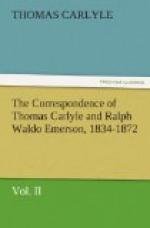Concord, 31 December, 1844
My Dear Friend,—I have long owed you a letter and have much to acknowledge. Your two letters containing tidings, the first of the mortal illness, and the second of the death of Sterling, I had no heart to answer. I had nothing to say. Alas! as in so many instances heretofore, I knew not what to think. Life is somewhat customary and usual; and death is the unusual and astonishing; it kills in so far the survivor also, when it ravishes from him friendship and the most noble and admirable qualities. That which we call faith seems somewhat stoical and selfish, if we use it as a retreat from the pangs this ravishment inflicts. I had never seen him, but I held him fast; now I see him not, but I can no longer hold him. Who can say what he yet is and will be to me? The most just and generous can best divine that. I have written in vain to James to visit me, or to send me tidings. He sent me, without any note, the parcel you confided to him, and has gone to Albany, or I know not whither.
I have your notes of the progress of my London printing, and, at last, the book itself. It was thoughtless in me to ask your attention to the book at all in the proof state; the printer might have been fully trusted with corrected printed pages before him. Nor should Chapman have taxed you for an advertisement; only, I doubt not he was glad of a chance to have business with you; and, of course, was too thankful for any Preface. Thanks to you for the kind thought of a “Notice,” and for its friendly wit. You shall not do this thing again, if I should send you any more books. A Preface from you is a sort of banner or oriflamme, a little too splendid for my occasion, and misleads. I fancy my readers to be a very quiet, plain, even obscure class,—men and women of some religious culture and aspirations, young, or else mystical, and by no means including the great literary and fashionable army, which no man can count, who now read your books. If you introduce me, your readers and the literary papers try to read me, and with false expectations. I had rather have fewer readers and only such as belong to me.
I doubt not your stricture on the book as sometimes unconnected and inconsecutive is just. Your words are very gentle. I should describe it much more harshly. My knowledge of the defects of these things I write is all but sufficient to hinder me from writing at all. I am only a sort of lieutenant here in the deplorable absence of captains, and write the laws ill as thinking it a better homage than universal silence. You Londoners know little of the dignities and duties of country lyceums. But of what you say now and heretofore respecting the remoteness of my writing and thinking from real life, though I hear substantially the same criticism made by my countrymen, I do not know what it means. If I can at any time express the law and the ideal right, that should satisfy me without measuring the




